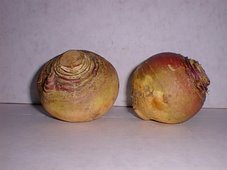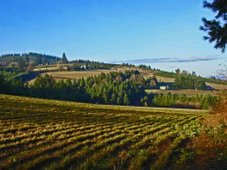UPDATE (January 28, 2010): The Canadian government escalated the border incident described below by confiscating the entire shipment of ARSI rutabagas and placing them in "permanent quarantine" in an abandoned uranium mine near Radium Hot Springs, B.C. The rutabagas were sealed inside a concrete shell at a depth of 6,879 ft., allegedly to "protect future generations from this highly-toxic, genetically-modified product." ARSI's team of litigators has filed a formal protest under NAFTA export rules.
___________________________________
On January 6, 2010, a tractor-trailer carrying a shipment of 2,680 kilograms of Grade A rutabagas was blocked by Canadian customs authorities near Sumas, Washington. The rutabagas were recently harvested from ARSI's experimental rutabaga fields outside Forest Grove, Oregon. They were destined for the tables and palates of the thousands of athletes and spectators who will be attending next month's Winter Olympics in Vancouver and Whistler, B.C.
The stated reasons for blocking the shipment were specious. Canadian border authorities demanded:
1. That ARSI pay a tariff in the confiscatory sum of $2.44 CDN per kilo;
2. That the rutabagas be placed in quarantine for six months to demonstrate that they are free of a rare fungus known as Karelian clubroot (Puccinia sparganioides); and,
3. That the experimental rutabagas (ARSI Lot #2009-ZX2375-VNB4) be shown to be "safe for human and animal consumption" before they can be admitted into Canada, preferably by "providing at least three peer-reviewed articles from reputable horticultural journals."
While she was detained at the border for over six hours, ARSI's truck driver overheard a Canadian customs official making the following remark to an inspector: "And if they manage to do all that, we'll come up with another list. That garbage will never get past the border as long as I'm wearing this uniform."
The refusal to admit the shipment is rapidly escalating into an international incident that could threaten the close ties between Canada and the U.S. ARSI's legal counsel has requested that the Obama adminitration file a formal protest and take further legal action "including, but not limited to, trade sanctions against producers of Canadian rutabagas and turnips."
At last report, the rutabagas are being stored temporarily in a warehouse near Sumas, Washington. As the photograph (left) shows, they have been carefully crated and remain in excellent condition.
The real reason for all the bureaucratic obstacles seems clear enough: Canadian rutabaga and turnip farmers, especially the huge co-ops in Saskatoon and Halifax, Nova Scotia, have always opposed ARSI's genetic innovations and open competition in a free market.
ARSI encourages its friends and supporters to contact their representatives in Congress to demand immediate measures to reverse this insupportable decision by Canadian customs authorities.






